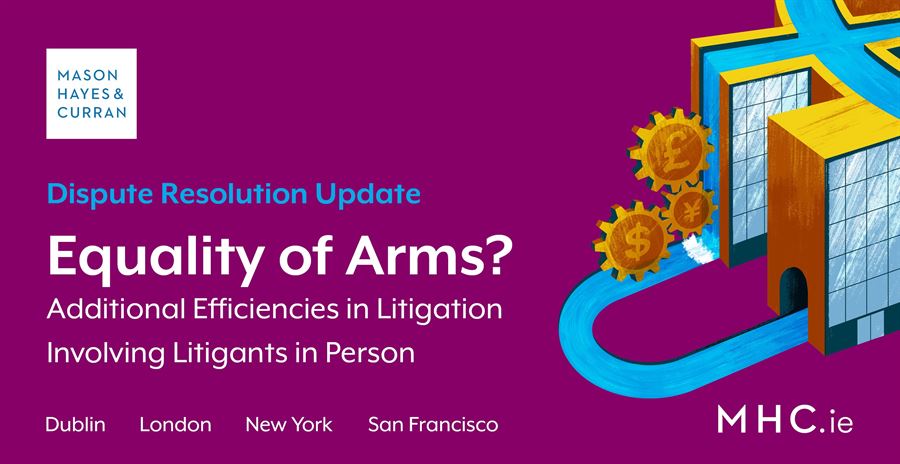
There has been an increase in recent years in the number of people before the courts that are not legally represented. It is difficult to get precise figures but some statistics indicate that the number is 30%[1]. In the area of debt collection and, in particular, housing mortgage repossession, this number is much higher, with some sources putting it at as high as 70%[2].
Litigants in person present before the courts in some cases due to choice and in others due to an inability to afford legal representation. Legal aid is available but to be eligible, certain criteria must be met in terms of means and merit. In mortgage repossession cases, access to legal advice is available under the Abhaile scheme. However, mortgage holders must meet certain criteria to be eligible.
The recent report of the Administration of Civil Justice Review Group noted that lack of legal representation can be an impediment to justice. It can also present challenges to the courts. In some debt collection cases. defendants are allowing judgment to be entered in default of a response to the plaintiff’s case because they have no representation. In other cases, defendants abandon their claims due to lack of representation. Trials involving litigants in person present difficulties for the court. In practice these cases tend to be to less efficient and go on for longer. This in turn contributes to higher costs.
Practice Direction HC54
To address these issues, a practice direction was introduced in the High Court in July 2010 governing proceedings where any party is not professionally represented.[3] It requires that both parties serve a form in advance of:
-
Making a pre-trial application, and
-
The trial of the proceedings.
It does not apply to proceedings which are heard in the family law list. The object of this form is to ensure that the litigant in person is sufficiently prepared for the trial and to increase efficiency of the trial hearing. The forms are available on the courts website[4] and set out what information is required at both stages.
The direction has been in force regarding applications and trials taking place since 4 October 2010. Failure to comply with any of the requirements of the direction may expose the party in default to liability for costs. However, the Review Group notes that the practice direction is not being complied with by parties and practitioners. The Review Group has recommended that it be implemented by the High Court Central Office, which would presumably mean that the Central Office will not issue pre-trial applications, or facilitate trials themselves, in the event of the parties’ non-compliance
Other measures to assist lay-litigants
In conjunction with this recommendation, the Review Group also highlighted a need for information guides to help litigants in person covering proceedings in all court jurisdictions. They recommend a collaborative approach between the courts administration, other justice agencies, the legal profession and the voluntary sector to assist litigants in person.
In England and Wales a central website “Advice Now” was created with practical and legal information on various aspects of law. The Review Group specifically identified the “Going to Court and Tribunal” section of this site which contains practical information on conducting proceedings in the family courts, civil courts and tribunals. The website is easy to navigate and written in plain English with links to sources of advice.
Information contained on the Courts website and indeed in the Courts office does not constitute legal advice. Therefore, the Review Group also recommended the provision of “drop-in” facilities near to court buildings. This would enable litigants in person to obtain legal advice from voluntary legal advice centres. These facilities are in operation in Scotland.
Comment
The combined approach of providing information from different sources and the implementation of practice direction HC54 will go a way towards not only assisting litigants in person, but also making court appearances more efficient in terms of time and cost. However, does the scope of practice direction HC54 go far enough?
With the current COVID-19 restrictions, there has been a substantial reduction in the number of cases being heard in the High Court. This has led to a significant backlog of cases waiting to be heard. There may be no better time to enforce High Court practice direction HC54. It may also be beneficial to extend it to cover other cases, such as summary judgment cases which have become more protracted in recent times. Using a form like that in practice direction HC54, perhaps with a maximum permitted word count, would allow each party to set out the basis of their claim, the sequence of essential facts that they contend, and any outline legal submissions. This would allow these cases to be dealt with more efficiently when they are back before the court. This would benefit litigants in person, legally represented creditors and the courts in terms of saving time and costs.
The Report in full can be accessed here.
For more information, please contact a member of our Dispute Resolution team.
[1] These figures are provided by the Supreme Court and Court of Appeal
[2] This information was obtained from research conducted by the School of Law in NUI Galway in which they examined 99 Circuit Court repossession cases before the County Registrar in Galway in December 2017 and January 2018.
[3] HC54 (Proceedings involving a litigant in person), available at: http://www.courts.ie/content/p...
[4] The forms can be accessed at https://www.courts.ie/content/...




